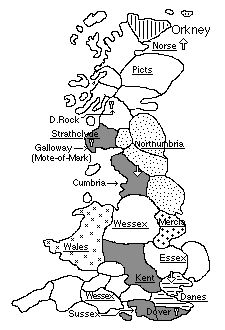 Bretwalda
Bretwalda Bretwalda
Bretwaldaby Mike Demana (article originally appeared in The Herald #30)
Winter's first blizzard settled over the kingdom of Kent. The Danish warriors surrounding the trapped Kentish army inside Dover awoke and smiled. A sign from Odin. This land, which now looked so much like their homeland, would be theirs.
The smiles turned to eager grins when the Kentish warleader, Aelfred, filed his army out the town gate, intent on breaking out. The two battlelines met and the Viking berserks pierced the Saxon center. The Danes surged wildly forward, but were unable to exploit the spearhead. Crafty Aelfred sent his right wing crashing in, driving the Danes back. The battle paused, teetering one way then the other, when the Saxon warleader met the Danish chieftain, Cuneglass. Steel flashed like the noon sun on ice, until Cuneglass fell wounded. His army rushed to bear him out of the fray, defeated.
 The Saxons
had little time to celebrate, though. A fresh Danish force appeared from
the north and rushed to Dover, ready for revenge. An equally close struggle
ensued. This time Aelfred withdrew, unwilling to let his kingdom's only
army bleed to death here. He would return in the Spring -- Dover should
hold out till then. While camped in the hills, his men were cheered by news
from Sussex. Their Wessex allies had won the province back for them, expelling
a Norse garrison after a grueling five month siege. The cold wind bit a
little harder when they heard that the Norse relief army finally arrived,
too tardy to save the garrison, but strong enough to besiege Cirencastor
again. Hope rode on the news from the north, though. Their ally Essex had
finally shaken off its lethargy and attacked the Danish garrison at Londinium.
Bottled up behind the walls, the Vikings in the south of England were under
assault from all sides. Time was on Aelfred's side.
The Saxons
had little time to celebrate, though. A fresh Danish force appeared from
the north and rushed to Dover, ready for revenge. An equally close struggle
ensued. This time Aelfred withdrew, unwilling to let his kingdom's only
army bleed to death here. He would return in the Spring -- Dover should
hold out till then. While camped in the hills, his men were cheered by news
from Sussex. Their Wessex allies had won the province back for them, expelling
a Norse garrison after a grueling five month siege. The cold wind bit a
little harder when they heard that the Norse relief army finally arrived,
too tardy to save the garrison, but strong enough to besiege Cirencastor
again. Hope rode on the news from the north, though. Their ally Essex had
finally shaken off its lethargy and attacked the Danish garrison at Londinium.
Bottled up behind the walls, the Vikings in the south of England were under
assault from all sides. Time was on Aelfred's side.
Far to the north, another leader contemplated the future. King Christian Ravenhawk of Strathclyde directed his forces as they converged on his occupied capital of Dumbarton Rock. Picts were pouring into the province, too, reinforcing it. He knew a great battle loomed. Gnawing at him, though, was news his old enemy, Northumbria, had invaded unprotected Cumbria. He summoned his personal herald. "Griffyd, I have an impossible task of you. Go to the court of mine enemy, King Eanred of Northumbria, and beseech him for me. Bribe him, lie to him, get him drunk, threaten him -- whatever it takes! Just convince him that the Picts are a common enemy, and to withdraw his invasion."
A month later, Ravenhawk's army faced that of the Pictish King Circinn, a week's march from his capital. The armies met with a roar of hatred steaming out of the mouths of thousands into the damp, cold air. The Pictish warbands smashed through his center. In dismay, Ravenhawk saw lightly-armed Pictish cavalry flood through the gap. However, a river of shining chainmail cut them off -- his heavy cavalry, plugging the hole. Heartened, the rest of the army halted its retreat and began to pressure the Picts. Squeezed from all sides, the Pictish spearmen and horsemen in the bulge were disordered. Retreat followed, then rout. Once again, the Britons had snatched victory from looming defeat. The way to Dumbarton Rock and the final liberation of Strathclyde's lands lay open.
Later, as winter's north winds began to weaken, Ravenhawk was pacing the siege lines of Dumbarton Rock. Victory's joy had been followed by even wilder elation when Griffyd's mission had somehow succeeded and Northumbria withdrew back across the border. A cold rain dashed his face, though, when word arrived that another Pictish army had besieged Mote-of-Mark in Galloway. Were their armies endless? Allies, the king needed allies! Perhaps the Norsemen, Ravenhawk thought. He'd heard that the tribesmen had been scattered by a Viking army when they tried to retake the Orkneys Ifrom the Norse. And could Eanred of Northumbria be trusted? If so, this could be the end of the Pictish menace, the king thought...